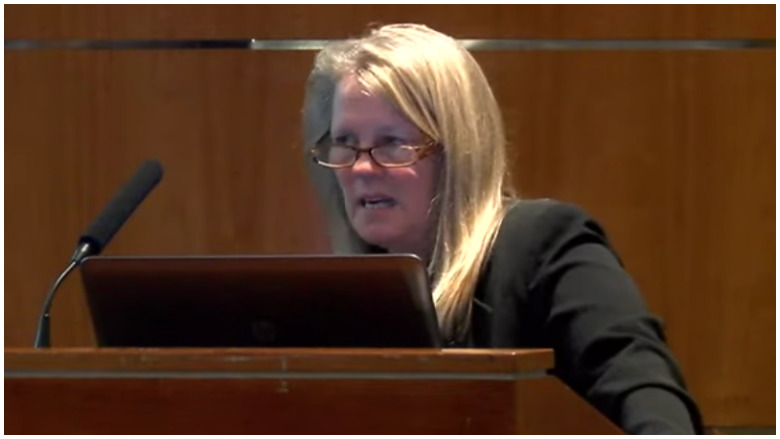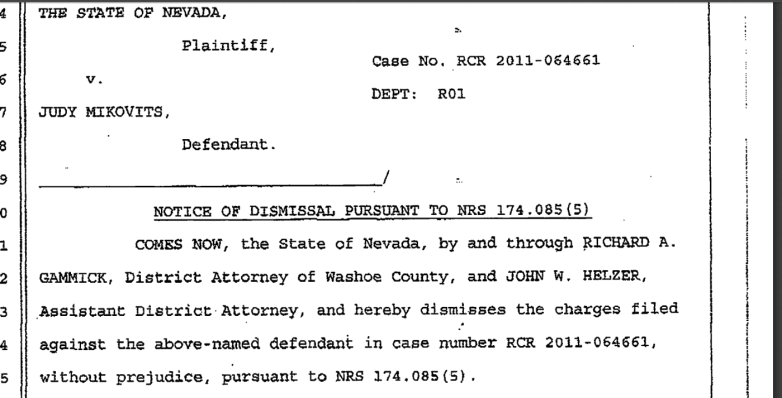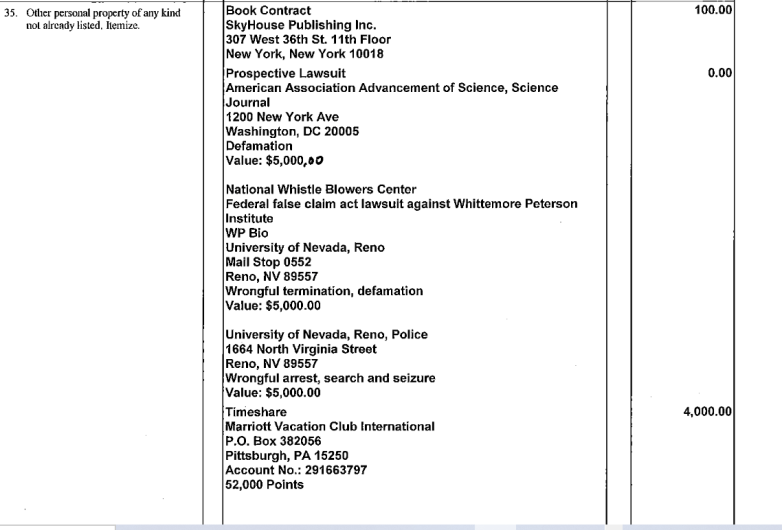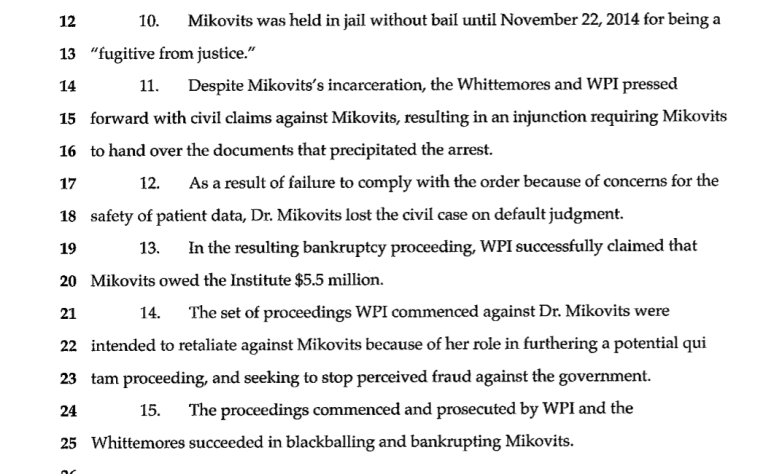
Judy Mikovits was best known for her research into chronic fatigue syndrome before she appeared in a viral and controversial online video for a film that criticizes the government’s handling of viruses.
Now the video in which Mikovits appeared in May 2020 has been scrubbed from prominent social media platforms, and she finds herself under renewed scrutiny. Controversy is nothing new to Mikovits, however; she’s been the focal point of it since 2011, when a prominent research study into chronic fatigue syndrome – for which she was a co-author – crumbled in high-profile fashion.
The video – a promotional teaser for a California production company’s movie called Plandemic – argues that the U.S. government’s strategy toward infectious disease, from HIV/AIDs to COVID-19 – is flawed by greed and misinformation. Heavy has conducted an extensive fact checking of various claims made in the Mikovits’ Plandemic video. You can read it here. The video can be found here.
Read about the man who created the movie here. Mikovits, who has a new book out, discusses her arrest and jailing in the video and raises unproven accusations against Dr. Tony Fauci. She was working for the Whittemore Peterson Institute for Neuro-Immune Disease, which is located in Reno, Nevada, when the chronic fatigue syndrome controversies broke out, although they terminated her. Mikovits’ beef against Fauci dates back to the early 1980s and who deserved credit for identifying the virus that causes AIDS. However, her later career focused on chronic fatigue syndrome, not HIV.
Heavy also reached out to Fauci for response to the video through his agency. Amanda Fine, chief of the news media branch for the National Institutes of Health, responded with this statement: “The National Institutes of Health and National Institute of Allergy and Infectious Diseases are focused on critical research aimed at ending the COVID-19 pandemic and preventing further deaths. We are not engaging in tactics by some seeking to derail our efforts.”
But what of Mikovits and her chronic fatigue syndrome research, which the movie touts as a “blockbuster”?
Here’s what you need to know:
Mikovits Was a Co-Author on a Major Scientific Research Study Into Chronic Fatigue Syndrome That Was Retracted
A 2009 article in the Reno Gazette-Journal describes how Mikovits’ grandfather was diagnosed with lung cancer when she was 12. Her parents were divorced, so she and her twin sister lived with their grandparents. This experience, watching her grandfather struggle with cancer, created a life-long interest in science.
The article discussed how Mikovits believed chronic fatigue syndrome carried a stigma because some people felt it was the result of emotional or psychological problems. XMRV, believed by her then to be a “new infectious human retrovirus,” made CFS sufferers feel better because there was a known cause for their ailment. At least, that is how it appeared until the research fell apart.
According to the Mayo Clinic, chronic fatigue syndrome is “a complicated disorder characterized by extreme fatigue that can’t be explained by any underlying medical condition. The fatigue may worsen with physical or mental activity, but doesn’t improve with rest.” The causes are not clear, the clinic reports.
Mikovits tried to pin a viral cause on cfs. Whether a virus causes the syndrome remains unclear today. “Because some people develop chronic fatigue syndrome after having a viral infection, researchers question whether some viruses might trigger the disorder,” the Mayo Clinic reports. “Suspicious viruses include Epstein-Barr virus, human herpes virus 6 and mouse leukemia viruses. No conclusive link has yet been found.”
The unraveling of Mikovits’ career as a scientific researcher dates to a single paper from 2009. Mikovits was a co-author in a paper called Detection of an Infectious Retrovirus, XMRV, in Blood Cells of Patients with Chronic Fatigue Syndrome. When the research study first came out, it received national headlines and acclaim. Her reputation and career unraveled two years later in spectacular fashion when the research study was retracted.
In 2009, when the study came out, it generated big positive headlines for both Mikovits and the Nevada non-profit where she was working, Whittemore Peterson. “A Big Splash From an Upstart Medical Center,” wrote The New York Times, which noted that the founders of the institute, Harvey and Annette Peterson, have a daughter with cfs, which afflicted a million Americans.
The Chicago Tribune reported in 2011 that the study, which was published in 2009, had consequences, writing, “The lead researcher, Judy Mikovits, began making sweeping unsupported statements about the finding, including tying XMRV to autism without publishing any data to support that statement. Some CFS patients began taking potent antiretroviral drugs meant to treat HIV.”
The New York Times reported that a “commercial lab associated with the Whittemore Peterson Institute began marketing screening tests for XMRV, the hypothesized cause of chronic fatigue syndrome, costing hundreds of dollars.” Two years after the study came out, it was retracted and repudiated by Mikovits’ scientific peers.
The abstract for the debunked 2009 study reads:
Chronic fatigue syndrome (CFS) is a debilitating disease of unknown etiology that is estimated to affect 17 million people worldwide. Studying peripheral blood mononuclear cells (PBMCs) from CFS patients, we identified DNA from a human gammaretrovirus, xenotropic murine leukemia virus–related virus (XMRV), in 68 of 101 patients (67%) as compared to 8 of 218 (3.7%) healthy controls. Cell culture experiments revealed that patient-derived XMRV is infectious and that both cell-associated and cell-free transmission of the virus are possible. Secondary viral infections were established in uninfected primary lymphocytes and indicator cell lines after their exposure to activated PBMCs, B cells, T cells, or plasma derived from CFS patients. These findings raise the possibility that XMRV may be a contributing factor in the pathogenesis of CFS.
At the time of the study’s publishing, Mikovits was still working as research director for the Whittemore Peterson Institute. The 2009 study was published in a prestigious journal and was expected to represent a breakthrough, Snopes reports, as it suggested a “viral cause” for chronic fatigue syndrome.
In 2011, the journal Science published an “editorial Expression of Concern.” In summarizing the research findings, the expression of concern noted that the article claimed “to show that a retrovirus called XMRV (xenotropic murine leukemia virus–related virus) was present in the blood of 67% of patients with chronic fatigue syndrome.”
However, other studies could not replicate the findings. “Since then, at least 10 studies conducted by other investigators and published elsewhere have reported a failure to detect XMRV in independent populations of CFS patients,” the expression of concern notes. Instead, there was a growing view that any association “likely reflects contamination of laboratories and research reagents with the virus,” the notation states.
The journal noted that the research “attracted considerable attention, and its publication in Science has had a far-reaching impact on the community of CFS patients and beyond.” However, because “the validity of the study by Lombardi et al. is now seriously in question, we are publishing this Expression of Concern and attaching it to Science’s 23 October 2009 publication by Lombardi et al.”
The authors issued a partial retraction of their findings, but the paper was later retracted in full. Mikovits was one of multiple authors listed on the study.
In the retraction, Bruce Alberts, the editor-in-chief, wrote that there “is evidence of poor quality control in a number of specific experiments in the Report” and noted that other studies couldn’t replicate the findings. “Science has lost confidence in the Report and the validity of its conclusions. We note that the majority of the authors have agreed in principle to retract the Report but they have been unable to agree on the wording of their statement,” Alberts wrote. “… We are therefore editorially retracting the Report.”
A 2012 release from the American Society of Microbiology says: “Contrary to previous findings, new research finds no link between chronic fatigue syndrome and the viruses XMRV (xenotropic murine leukemia virus-related virus) and pMLV (polytropic murine leukemia virus).”
Fauci played a role in the ultimate discrediting of the research; according to Discover magazine, “the NIH’s AIDS czar, Anthony Fauci, asked his friend Ian Lipkin, a neurologist and virus hunter at the Center for Infection and Immunity at Columbia University’s Mailman School of Public Health, to settle the impasse” — the debate about the findings. Lipkin’s findings demonstrated that “XMRV was not actually a human pathogen … but a man-made contaminant unwittingly manufactured in a lab in the 1990s,” the magazine reported.
Mikovits participated in Lipkin’s study and also concluded that it was “the definitive answer. … There is no evidence that XMRV is a human pathogen.”
Annette Whittemore, the co-founder of the Institute where Mikovits was working, told Health Rising, “The demise of XMRV was a double-edged sword. On the one hand, it was deeply disappointing to learn that XMRV was not involved in the disease because many were hoping that XMRV would validate this illnesses’ physical nature and lead to effective treatments. On the other hand, I think that most were thrilled to know that the retrovirus, XMRV, wasn’t causing their illness.”
Mikovits Was Accused of Stealing Equipment & Keeping Laboratory Notebooks

Judy Mikovits’ charges dismissed.
Mikovits’ claims of persecution revolve around the story of her brief arrest and jailing. However, the truth is more complex than the picture of that incident in the video.
Gladstone Observer reports that Mikovits was the subject of an “internet myth” dating to 2018 that she was “thrown in prison for research that led to the discovery that deadly retroviruses have been transmitted to 25 million Americans through human vaccines.” The Plandemic video resurrects elements of this claim, painting her arrest as unfair retribution.
The eventually dismissed criminal case against Mikovits received fairly extensive news coverage at the time. According to Science magazine, in November 2011, the district attorney in Washoe County, Nevada, filed a criminal complaint against Mikovits that “charged the virologist with illegally taking computer data and related property from her former employer, the Whittemore Peterson Institute for Neuro-Immune Disease (WPI) in Reno, Nevada.” (Heavy has reached out to the Whittemore Peterson Institute for comment on Mikovits.)
The Chicago Tribune reported that the “University of Nevada, Reno police issued an arrest warrant listing two felony charges: possession of stolen property and unlawful taking of computer data, equipment, supplies or other computer related property.”
In her book, Mikovits claims her “real crime” was “following the data and listening to the patients.” She claims her legal problems led to bankruptcy.
She was briefly jailed, but the DA later tossed the charges, Science magazine reports. (Heavy has contacted the district attorney’s office seeking comment and the original criminal complaint).
According to Science magazine, the WPI co-founder, Harvey Whittemore, was accused criminally in a separate campaign finance donation case, complicating the case against Mikovits due to witness issues. She told Science magazine that the case made it hard for her to find work, other than a study she was working on that was funded by National Institutes of Health. In 2014, Whittemore started serving a two-year sentence in federal prison “for breaking campaign contributions laws,” according to the Review Journal. A jury found that he funneled $133,400 in unlawful contributions “to the campaign of U.S. Senate Majority Leader Harry Reid, D-Nev,” the newspaper reported.
According to Courthouse News, Whittemore, described as a lobbyist, was also accused in 2016 of hiding millions of dollars from creditors. He was freed from prison that same year.
In the criminal case against Mikovits, Science magazine quoted the prosecutor as explaining why the charges were dismissed: “There’s a lot going on with the federal government and different levels that wasn’t occurring when we first became involved with prosecuting this case. And we have witness issues that have arisen.”
It’s true Mikovits faced bankruptcy at one point. Heavy has obtained the bankruptcy petition through the federal court system. You can read it here: Judy Mikovits Bankruptcy Filing. The section for personal property in the bankruptcy filing is a window into Mikovits’s professional troubles at the time.

Section from Judy Mikovits’s bankruptcy petition.
She also filed a civil lawsuit against the Institute. You can read that here: Judy Mikovits Lawsuit. It includes these claims:

A passage from the Judy Mikovits lawsuit.
According to the docket, her lawsuit was dismissed. The court wrote, “Plaintiff is pro se and has failed to file proof of service in violation of the rules and the Court’s orders. Both of these facts independently merit dismissal of the claim.”
The WPI organization also filed a civil suit seeking materials from Mikovits including laboratory notebooks used for research. The New York Times reported that a lab employee, Max Pfost, said in an affidavit that “he took items at her request, stashing notebooks in his mother’s garage in Sparks, Nev., before turning them over to Dr. Mikovits.”
He claimed that “Mikovits informed me that she was hiding out on a boat to avoid being served with papers from W.P.I.,” Pfost said in the affidavit obtained by The Times.
Some argued that the judge in the case was biased because of campaign donations received from Whittemore.
A 2009 article in The New York Times says the Whittemore organization was founded as a result of Harvey and Annette Whittemore’s “desperation to find answers for an incurable disease.” The Times article reports that the Whittemores met Mikovits in 2006. The article says that, at that time, she was “a virus expert who had spent 22 years working at the National Cancer Institute.”
She left the institute in 2001 to get married and move to California, “where she went to work for a drug development company that failed,” the Times reported. “She was tending bar at a yacht club when a patron said her constant talk about viruses reminded him of someone he knew in Nevada.” That person connected her to Annette Whittemore, according to the newspaper. She started studying retroviruses for them. That same year, she linked retroviruses to autism.
The institute describes itself as “a non-profit medical research institute dedicated to the support of those with a spectrum of neuro-immune diseases (NIDs) including: myalgic encephalomyelitis, (ME), fibromyalgia, and similar complex chronic diseases of the immune system and the brain.”
Science magazine reported in 2011 that, according to WPI, “after Mikovits was terminated on 29 September, she wrongfully removed laboratory notebooks and kept other proprietary information on her laptop and in flash drives and in a personal e-mail account.” The group “won a temporary restraining order that forbids Mikovits from ‘destroying, deleting, or altering’ any of the related files or data.”
In 2011, Nature.com reported that Mikovits “lost a civil lawsuit filed by her former employer.” The site reported that WPI’s lawyer released a statement saying, “At yesterday’s civil hearing, the Honorable Brent Adams found that Dr. Mikovits’ degree of non-compliance with the court’s orders was willful and deliberate without justification. Consequently, the judge entered a default judgment in favor of Whittemore Peterson Institute and also awarded the Institute attorney’s fees. Most importantly to the Institute, today’s ruling requires immediate return of all misappropriated materials.”
The article claims she spent four nights in jail.
Heavy has reached out to Mikovits for comment through her publisher.
Kennedy wrote in Mikovits’ book that it was her “obligation to retain all her research papers” and said she “languished in a cell.” He painted her as a figure of persecution for her scientific integrity. He wrote that Judy Mikovits is “heir to … martyrs and, more directly, to a long line of scientists, whom public health officials have punished, exiled, and ruined specifically for committing heresy against reigning vaccine orthodoxies.” Kennedy has spoken out against vaccines before, although he denies he’s anti-vaccine.
Mikovits worked on HIV early on in her career, but it wasn’t the focus of the controversial research study that hit the headlines later on.
In the wake of the retracted article, Mikovits lost her job. According to Nature, she was fired in October 2011 after “she clashed with the institute’s president and co-founder, Annette Whittemore, over the work of another researcher.”
The Nature article claims that Mikovits wasn’t fired because of the retracted research paper but rather due to a “laboratory power struggle.” She was accused of refusing to allow another researcher into a lab to work with a cell line. According to Nature, Mikovits claimed that such an experiment would have been outside federal funding requirements.
According to Nature, the following day, a blogger “posted a figure from a 2009 paper that Mikovits co-authored in Science alongside one that Mikovits used in a recent presentation. The two figures, which are used to describe different results, look identical, except for the labelling.” Mikovitz defended the changes, saying they were appropriate.
A lengthy article on Mikovits in 2014 in the Ventura County Star provided some colorful details on her life. It said she has gone by the name Judy Nolde and gave an interview “sitting in her 38-foot fishing boat in a racket club cap and flip-flops.”
An old government bio for her says Mikovits has a Ph.D. in biochemistry and molecular biology from George Washington University.
Another old bio for her says she also served “as a senior scientist at Biosource International, where she led the development of proteomic assays for the Luminex platform that is used extensively for cytokine activity assessment in therapy development” and served as “Chief Scientific Officer and VP Drug Discovery at Epigenx Biosciences, where she lead the development and commercialization of DNA methylation inhibitors for cancer therapy and of cell and array-based methylation assays for drug discovery and diagnostic development.”
READ NEXT: Is a Sore Throat an Early Symptom of Coronavirus?